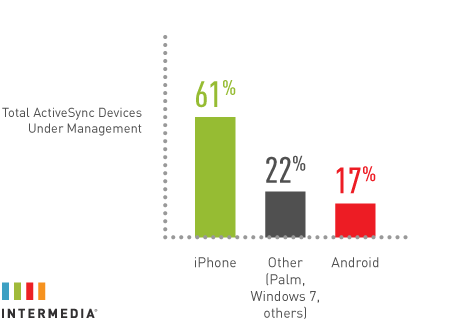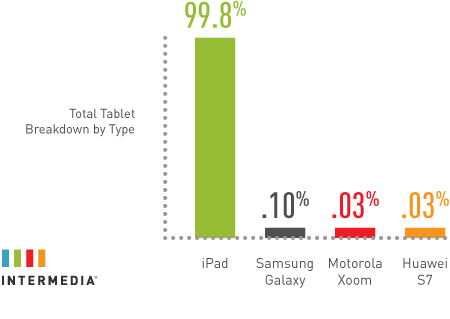The business user data was released this week by Intermedia, the world's largest Microsoft Exchange hosting provider with 320,000 premium hosted Exchange e-mail accounts. In addition a strong lead for the iPhone, the data also shows market dominance for the iPad, with a 99.8 percent share of ActiveSync-based tablets.
Apple and Google were found to be the leaders in enterprise smartphone operating systems, while the remaining players — Windows Phone, Nokia Symbian and Palm's webOS — accounted for the 22 percent of platforms in the "other" category.
Intermedia's numbers also show that Apple's share of the enterprise continues to grow. In April, the iPhone remained the number one device, and even increased its share to 64 percent among new devices. Android's share also climbed to 33 percent for the month, showing that both platforms are making gains at the expense of competitors.
iPad share continued to remain dominant in April as well, with close to 100 percent of new tablet activations being iPads. Intermedia said it typically sees about 300 new iPads activated in its service per month, but that number jumped to over 900 in March and more than 1,200 in April.
"Professionals want to sync and manage their business email, contacts, and calendars across their computers, smartphones, and tablets," said Jonathan McCormick, chief operating officer of Intermedia. "They also want to use the brands of their choice. Supporting these options can strain an IT department accustomed to managing only one type of device — or an entrepreneur with no IT staff to help with set up. Email services like Intermedia's deliver these productivity capabilities with the click of a mouse and back them up with 24x7 support from certified professionals."
Apple regularly boasts about the success that it has had with the iPhone in enterprise, as well as the quick adoption the iPad has found in the corporate world. In its last quarterly earnings conference call, the company revealed that 88 percent of the Fortune 500 are testing or deploying the iPhone, while 75 percent are utilizing the iPad.
Apple Chief Operating Officer Tim Cook also said that the success of the iPad and iPhone have created a "halo effect" for the Mac. As companies have made iOS-based devices a part of their employees' available tools, they have also begun buying Macs for corporate use.
 Slash Lane
Slash Lane








-m.jpg)






 Wesley Hilliard
Wesley Hilliard
 Marko Zivkovic
Marko Zivkovic

 Malcolm Owen
Malcolm Owen

 Amber Neely
Amber Neely

-xl-m.jpg)









44 Comments
This is somewhat surprising given that enterprise traditionally favors PCs over Macs (and still do). Yet you'd think they would be all over the Mac for its ease-of-use and high level of integration. It took adoption of iOS devices to get them to notice the Mac?
Google "products" in general are not very appealing for corporate users. I doubt Android will ever be any more popular with corporate clients than gmail or google docs. The main reasons are (1) data security, (2) support, and (3) feature sets.
Google "products" in general are not very appealing for corporate users. I doubt Android will ever be any more popular with corporate clients than gmail or google docs. The main reasons are (1) data security, (2) support, and (3) feature sets.
In short, 'fragmentation'.
Also, good quotes on "products".
Google's 'product' is you.
Where is the data for Blackberry does it not use ActiveSync?
This is somewhat surprising given that enterprise traditionally favors PCs over Macs (and still do). Yet you'd think they would be all over the Mac for its ease-of-use and high level of integration. It took adoption of iOS devices to get them to notice the Mac?
People forget (or perhaps never knew, depending on age) just how bad things got for the Mac in the late 1990s. Not only were things bad for Apple from a business perspective, but there were a good 5 years (at least) where the Mac was technologically a mess. The Copland shipwreck left Apple with an ancient OS that had been poorly maintained and the PPC shipwreck left Apple with chips that were way slower than the Intel/AMD competition. When Jobs returned, he did as much as he could as fast as he could, but there was a lot to do and it took time. Apple managed to get the classic Mac OS back in usable shape by the time version 8 rolled around, but it was still creaking along on an ancient foundation. And the PPC G4 was a joke compared to the AMD Athlon.
It really wasn't until Tiger + Core2Duo that Apple had a product that could possibly compete for business users attention. Leopard and Snow Leopard, plus Office 2011, plus VMWare, have moved things further still. I actually think it's remarkable just how well Apple has been able to do with Macs in business given the long memories of corporate IT. It just goes to show how truly awesome Macs are today that Apple is able to overcome those well-earned prejudices.